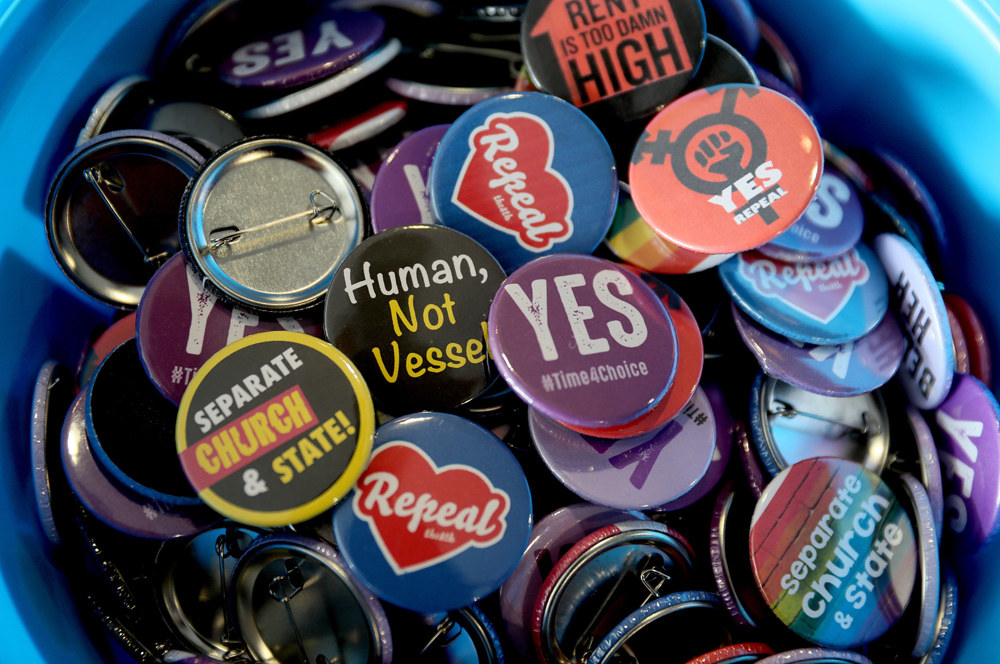
Tech giants Google and Facebook have launched a major crackdown on foreign advertising ahead of the Irish abortion referendum.
The move has been welcomed by those seeking to legalise abortion in Ireland, while those seeking to retain the current law, which prohibits the procedure, have accused the tech companies of election rigging.
On 25 May, Ireland will vote on whether or not to repeal the Eighth Amendment of the constitution, which gives the foetus and the mother an equal right to life.
Ireland's capital, Dublin, hosts the European headquarters of both Google and Facebook.
On Wednesday, Google announced that it will now reject any ads relating to the referendum, due to take place on 25 May.

"Following our update around election integrity efforts globally, we have decided to pause all ads related to the Irish referendum on the Eighth Amendment," a Google spokesperson said.
"As part of our efforts to help protect the integrity of elections and referendums from undue influence, we will reject ads related to the referendum if they appear to be from foreign advertisers outside of Ireland.
"The tools we are building for election integrity include a verification requirement that requires the advertiser to be resident in the country where the election is taking place."
The change will come into effect in the next 24 hours and means that advertisers on either side of the debate, both from within Ireland and overseas, will not be able to pay to promote any content connected to the vote.
The ban will also apply to YouTube and AdWords, which are owned by Google.
The move follows pressure from Ireland's edition of the Times, which on Tuesday revealed that Facebook would no longer accept ads relating to the referendum from anyone outside of Ireland. Those within Ireland can still pay to promote and target posts encouraging either a "yes" or "no" vote.
Facebook's decision to ban foreign ads comes shortly after the launch of a "view ads" transparency tool that allows users to see more detail on ads that are appearing on the social media platform.

A spokesperson for Facebook told BuzzFeed News that the move had not been made because a large number of foreign ads had been uncovered by the transparency tool. They said that until this week's early rollout of a verification tool that allows them to determine whether an ad is being placed from within Ireland, they were unable to isolate data on referendum ads based on location.
While Irish electoral law prohibits campaign donations from foreign parties, the restriction does not extend to online spending, and there has been concern that international groups could exploit this loophole to influence the vote.
There has been evidence of non-Irish groups paying to target posts at Irish voters, including a British group with links to the US anti-abortion movement.
Together for Yes, which is campaigning to repeal the Eighth Amendment, and Save the 8th, which is pushing for a No vote, have both said that online advertising will form a significant part of their campaigns. Both appear regularly in data on targeted Facebook ads collected by Ireland's Transparent Referendum Initiative using the Who Targets Me tool.

John McGuirk, communications director of the Save the 8th campaign, said that tightening of restrictions on ads was biased in favour of the Repeal campaign.
"'Concerns about election integrity' = 'Concerns the wrong side might win'," he wrote on Twitter, specifically referencing Google's statement.
"Anything that has to be done to get this thing passed, clearly will be done. This is rigged," he added.
A joint statement released by Save the 8th alongside the Pro Life Campaign and The Iona Institute echoed this sentiment.
"It is very clear that the government, much of the establishment media, and corporate Ireland have determined that anything to secure a Yes vote must be done," it read.
"This decision has been taken because one side in this referendum is afraid it is losing, and wants to prevent voters from being informed."
But those campaigning for a Yes vote welcomed the move.
"This creates a level playing field between all sides, specifically in relation to YouTube and Google searches, who can now seek to convince the Irish electorate by the strength of their argument and power of personal testimony, not by the depth of their pockets," Ailbhe Smyth, the co-director of abortion rights campaign, Together for Yes.
A spokesperson for Repeal Shield, a blocking tool that collates data on Twitter accounts sharing false information shared by anti-abortion accounts, also welcomed the news.
"Like everyone campaigning for a free and fair vote on May 25th, the volume and intensity of anti-choice adverts on sites like Facebook and YouTube was a serious concern for us," they told BuzzFeed News.
"We welcome this development as a necessary step to combat fake news in the run-up to the referendum."
"This is not about which side of the referendum you’re on, Yes or No," Ireland's Green Party leader Eamon Ryan, who backs a Yes vote, told the Irish Times. "It is about protecting the integrity of our referendum and political system.”
